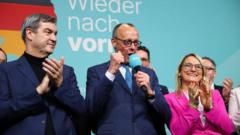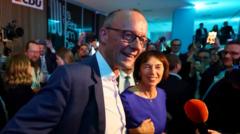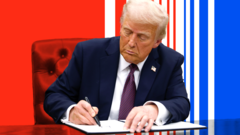The latest German elections have provided a complex picture, where the conservatives emerge victorious but face the reality of a resurgent far-right party. Friedrich Merz, leading the Christian Democrats (CDU), celebrated his party's electoral win, although their 28.6% vote share fell short of the anticipated 30%. Merz, acknowledging the weight of expectations, expressed determination to form a coalition swiftly to address the country's pressing issues, ranging from economic stagnation to immigration reforms.
Germany's Conservatives Triumph, But Far-Right Surges to Historic Heights

Germany's Conservatives Triumph, But Far-Right Surges to Historic Heights
Friedrich Merz's Christian Democrats secure electoral victory, but the far-right Alternative for Germany marks a record performance, signaling shifting political dynamics.
Alice Weidel, the chancellor candidate for the far-right Alternative for Germany (AfD), achieved a historic second-place finish with 20.8%. Despite this achievement, the mood within the AfD was mixed, as members had hoped for an even stronger outcome. Weidel asserted that the German electorate's choices reflected a demand for change, indicating skepticism about Merz's coalition-building efforts.
Voter turnout reached a striking 83%, a level not seen since before German reunification in 1990. This surge in participation demonstrated a clear public interest in the electoral landscape, with significant voting patterns emerging in different regions. The CDU found stronger support in the western portions of the country, whereas the AfD dominated in the east, echoing long-standing regional divides.
Merz has ruled out collaboration with the AfD, adhering to a widely recognized political boundary in Germany that prevents mainstream parties from engaging with far-right factions. Meanwhile, his traditional partners, the Social Democrats, suffered one of their lowest results in party history, further complicating potential coalition pathways.
With the possibility of a two-party coalition in doubt, the conversation is likely to turn to the Greens, whose political influence has also been marked by fluctuating approval ratings. Any coalition formation in the current landscape promises to be challenging, given the mixed results for all parties involved.
The aftermath of the election saw reactions from international figures, such as Donald Trump, who praised Merz's victory as a reflection of a discontent with current political agendas, particularly regarding energy and immigration policies. Despite Trump’s comments, Merz emphasized a focus on strengthening European autonomy independent of U.S. influence.
The youth vote appears to be shifting priorities, gravitating toward parties such as the AfD and the Left, which has also seen a recent surge in popularity. A dynamic social media campaign featuring the Left's co-leader has been effective in engaging younger voters, creating a fragmented yet significant power play in future political discussions.
In conclusion, the results of this election set the stage for a new political arena in Germany. With Merz at the helm of a mainstream party facing a strengthened far-right, the implications for national and European policies could be profound as the CDU navigates an increasingly complex political landscape. As parties recalibrate their strategies, the focus now shifts to coalition negotiations and the forthcoming challenges they will need to address in a divided nation.
Voter turnout reached a striking 83%, a level not seen since before German reunification in 1990. This surge in participation demonstrated a clear public interest in the electoral landscape, with significant voting patterns emerging in different regions. The CDU found stronger support in the western portions of the country, whereas the AfD dominated in the east, echoing long-standing regional divides.
Merz has ruled out collaboration with the AfD, adhering to a widely recognized political boundary in Germany that prevents mainstream parties from engaging with far-right factions. Meanwhile, his traditional partners, the Social Democrats, suffered one of their lowest results in party history, further complicating potential coalition pathways.
With the possibility of a two-party coalition in doubt, the conversation is likely to turn to the Greens, whose political influence has also been marked by fluctuating approval ratings. Any coalition formation in the current landscape promises to be challenging, given the mixed results for all parties involved.
The aftermath of the election saw reactions from international figures, such as Donald Trump, who praised Merz's victory as a reflection of a discontent with current political agendas, particularly regarding energy and immigration policies. Despite Trump’s comments, Merz emphasized a focus on strengthening European autonomy independent of U.S. influence.
The youth vote appears to be shifting priorities, gravitating toward parties such as the AfD and the Left, which has also seen a recent surge in popularity. A dynamic social media campaign featuring the Left's co-leader has been effective in engaging younger voters, creating a fragmented yet significant power play in future political discussions.
In conclusion, the results of this election set the stage for a new political arena in Germany. With Merz at the helm of a mainstream party facing a strengthened far-right, the implications for national and European policies could be profound as the CDU navigates an increasingly complex political landscape. As parties recalibrate their strategies, the focus now shifts to coalition negotiations and the forthcoming challenges they will need to address in a divided nation.






















